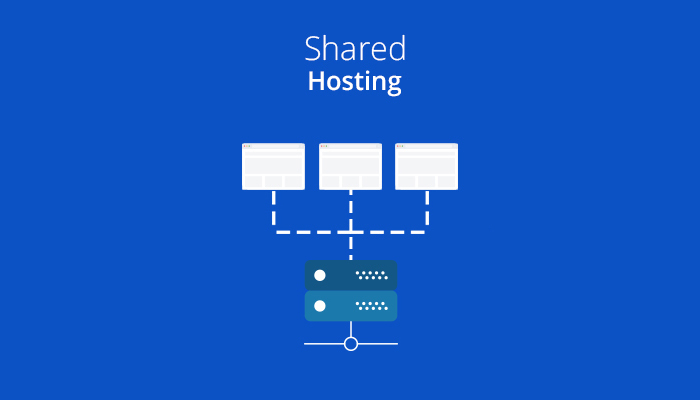If you’re not really a tech guy, and suddenly need to build a website for a purpose, be that personal, be that business, you probably already have learned that you’ll have to buy hosting to host your website.
Learning that was not really a daunting task, right? What might be itching you is which hosting plan means what, and which is suitable for you, that you’ve been offered by the hosting companies.
Most of the hosting companies offer 3 major hosting plans: Shared Hosting, VPS (Virtual Private Server), Dedicated Server Hosting Plan.
I’ll try to interpret those technical terms for you, in as much simple words possible.
Before I try to explain different hosting types, would you allow me to explain ‘Hosting’ itself in brief? If you understand how actually hosting works, it’ll be much easier for you to understand which specific facts influence different hosting plans.
Table of Contents
So, what actually hosting is? How does it work?
Look, in simple terms, hosting is nothing but storing some files in a computer that is always connected to a network, making those files accessible from other electronic devices like computer, phones, tablets etc.
A host/server computer has most of the components like your computer has, Storage Drive, RAM, processor etc. The specialty of host computers is they’re optimized particularly to host (store) and serve data for websites so that people can visit those websites.
Now, just like the hardware configuration of your PC affects its performance, same happens with these host computers. Different hardware configuration of host computers affects the website’s performance that’s hosted in it. That’s how different hosting plans are created, offering you a different level of performance at a different price.
If you’ve understood that, you’re expected to understand the different hosting plans I’ll now try to interpret.
Shared Hosting
In case of shared hosting, many websites are hosted on ‘One’ server computer. All the physical capabilities of that server are shared among the websites, like RAM, CPU time etc., except for space, which usually is specifically allocated to a hosting account.
You can compare it with renting a room in a house. You will have a dedicated room to your own in that house, along with other roommates. Just like having dedicated space in the server.
However, you will still have to share the other facilities, such as the kitchen, bathroom and living room, with the other roommates. Just like you’ll have to share CPU time, RAM etc. resources with other websites hosted on a server.
As you rent only rooms in a house to minimize the cost, same happens with shared hosting as well. It usually is the cheapest of all the plans. They usually range from 3$ 10$ per month depending on the hosting provider you choose.
Now, from the explanation, it might seem that shared hostings are very low in performance and like one of those products in the market that is cheap and low quality.
It certainly is NOT. In fact, the bigger chunk of all the websites is hosted in shared hosting. Mainly because, the performance that shared hostings provide that you might have considered as low-end, is actually more than enough for most of the websites.
Shared hosting servers are mainly managed by the hosting provider. All the hassle and optimization is up to them. There’s nothing much to do at the customers’ end, so technical knowledge is not must. This is a plus point for most of the newcomers in the website era.

Correspondingly, there’s not much scope for customization from customers’ end. But usually, the small business or personal websites doesn’t require much customization.
Shared hostings are comparatively vulnerable to viruses and other malware. If one website in a server gets affected, there’s a chance that other websites may get affected as well. Though the technical team of most of the reputed provides are skilled enough to fight these situations, still, it does not completely eradicate the risk.
If you are planning to make a website for a small business, or for personal portfolio, and your website won’t need any special customization, shared hosting plan might provide the best value for money for you.
VPS (Virtual Private Server)
Pretty similar to shared hosting. Many websites in ‘One’ server. But this time the term ‘Many’ actually means not so many like shared hosting. When it comes to VPS, there is comparatively less number of websites in one server.
Moreover, this time most of the resources are dedicated, not only storage. You get dedicated CPU Cores, RAM, Storage, Bandwidth etc. Dedicated means dedicated. No matter how resource hungry the other hosted websites are, they’ll never be able to put hands on your resources. That’s why the performance of VPS are comparatively better than Shared hostings.
That’s why it’s called Virtual Private Server. The server is actually not your private property only. But the allocation of resources makes it look like one. Just like Virtual Reality, you know, gives you the virtual experience of having a private server.

Compare it with renting a unit or apartment on a flat or building. You’ll not share facilities like the bathroom, living room, or kitchen with other people. You also will have great control and freedom over your apartment.
However, since the building is actually not your own and you’re sharing it with other people, you will still have to be sharing certain facilities with the other people in the building, such as the electricity and water systems.
And as I mentioned, there will be significantly lesser residents per building and each of the resident will have greater space.
VPS usually costs between 10$ to even 100$ per month depending on how much dedicated resource you’re seeking. Though some companies offer VPS even at lesser price, pretty close to shared hosting.
VPS is more secure than shared hostings, because of the virtual allocation/separation. And as there’s less number of websites on a server, the chance of getting affected also gets lower. Though it’s not the safest, because at the end of the day the websites, be that low in number, are still hosted on one server. However, they’re safer than shared hosting.
The customers have the responsibility to maintain their own VPS. VPS are not directly managed by hosting providers. Some sort of technical skill is needed from the customers’ end to manage a VPS. That said, a customer gets the scope of customization according to their needs as well.
The people that choose VPS mainly chooses because of the customization ability it offers. If you’re willing to make a website that’ll demand some customization made in the server itself like custom software etc., then VPS is for you. Also if you think your website is going to get medium to a heavy volume of visitor, you should consider going for VPS.
Many people also tend to choose VPS being unsettled by the thought of sharing space and speed with an unknown number of others. If it’s your case as well, choose VPS and stay certain.
Dedicated Server
The name is self-explanatory. A physical server that is dedicated only to you. You don’t share anything and enjoy 100% of the resources that your server offers processing power, RAM, storage – everything, simple as that. No one will be competing for your resources, and thus the performance of dedicated servers are the best. (if you already didn’t guess)
You have the right to configure your server as you like. You also don’t face any bad neighbor effect that Shared and VPS hosting owners may face. In those cases, if one website in a server gets affected by virus and stuff, there’s a possibility that other Websites might get affected too. That definitely is not the case with dedicated servers.
That said, it can also be understood that you have the full responsibility to manage the server. So you’re going to need good technical skill to maintain your server.
You can compare dedicated servers with owning a house. You enjoy every resource, and you can customize it as you want. Maybe paint the walls red, or blue, or yellow – whatever you want.

Dedicated hosting plans are the most expensive ones. It ranges from $80 to $500 per month, depending on the configuration of the server you demand.
Dedicated servers are the safest. As I mentioned earlier that there’s no bad neighbor effect, there’s zero chance of getting affected by someone else. This exclusivity makes them the safest type of hosting plan.
This plan is best suited for very large businesses and websites that expect more than half a million visitors a month. Also, those websites that require a higher level of customization. Dedicated servers are best for security to websites or businesses that keep security as the topmost priority also considers dedicated hosting.
Wrapping Up:
Hopefully, I could give you a solid overview of what hosting is and what are the basic traits and differences of hosting plans. The last advice I want to pass to you regarding buying a hosting is, you should mainly focus on the expected structure and expected traffic volume of your website, and buy a plan accordingly. Don’t overkill.
If it’s the first website you’re starting with, a good idea will be starting small with a reputed shared hosting plan. There’s always scope to upgrade migrate your site to VPS, dedicated or cloud hosting later as your site grows.

